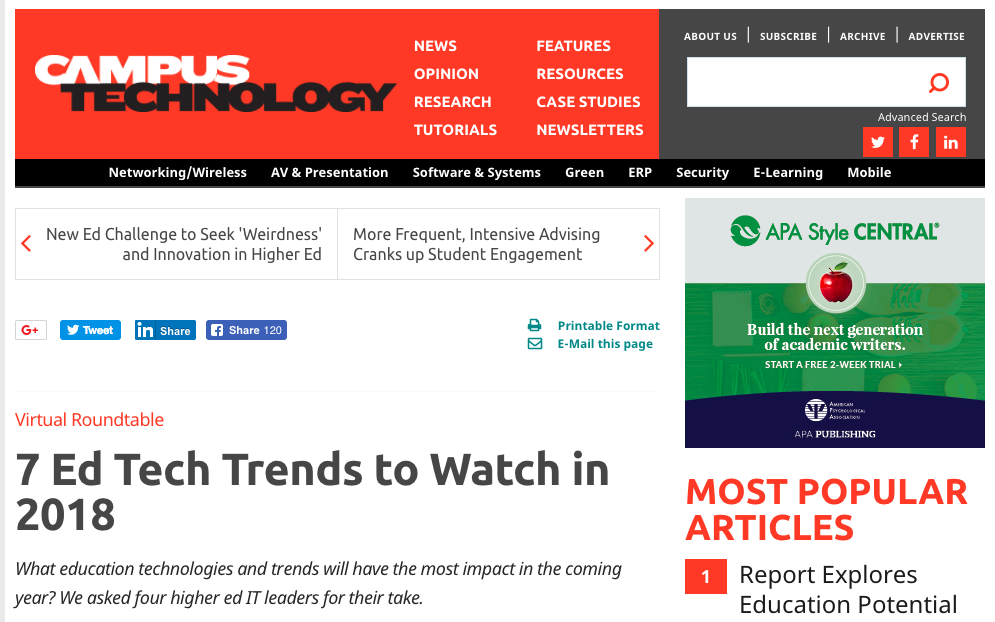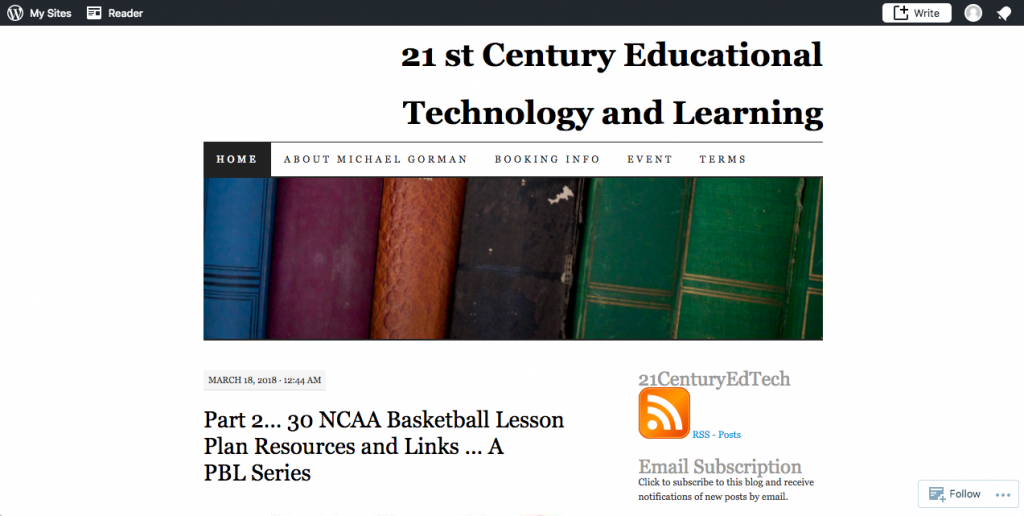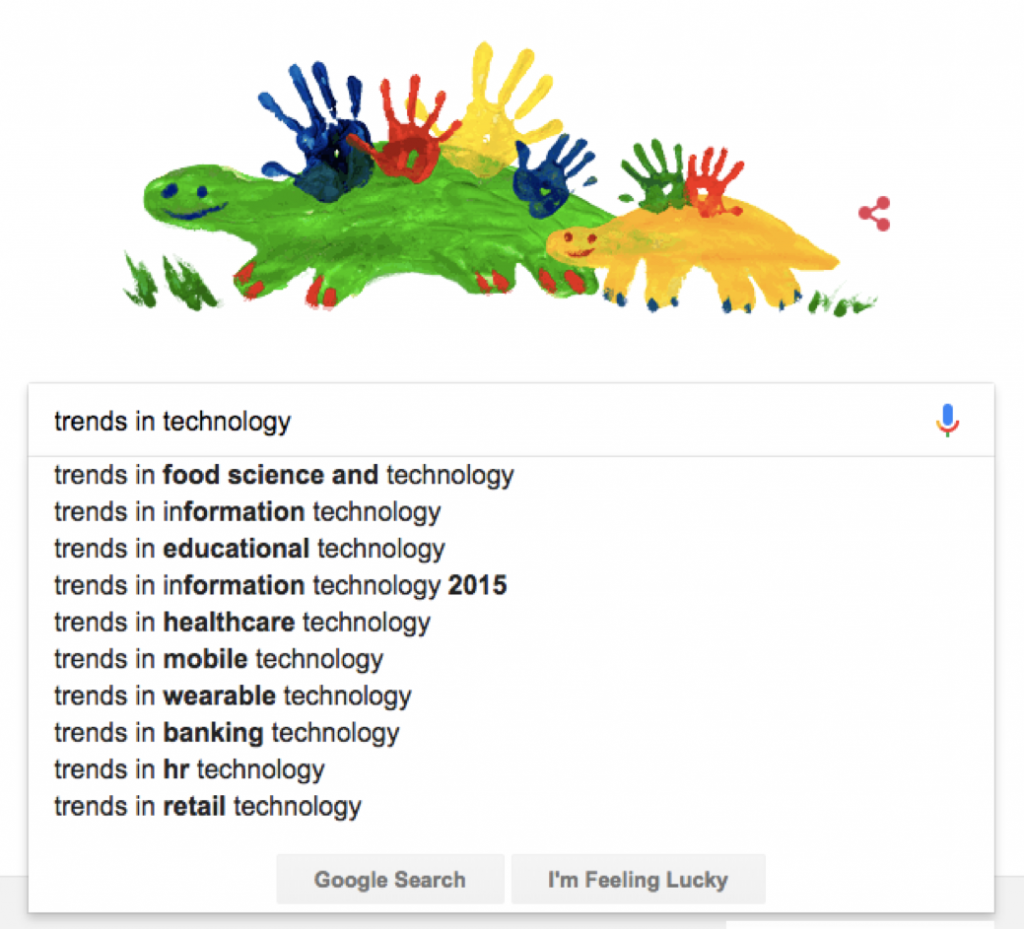Who or what are determining the trends in Educational Technology?
The what?
I started writing this post with the intention of exploring the emerging trends we are seeing in EdTech today, such as cloud based learning, AR/VR, coding as literacy and many more. I enjoyed combing through the plethora of online blogs, opinion pieces and articles about the top upcoming EdTech trends. The blogosphere provided an over whelming and diverse insight into some of technologies and ideas that are being used or advocated for in schools.
The first issue I came across was defining what trend actually means. Oxford online dictionary provided three definitions and personally I find all three to mean very different things. What distinguishes a trend from being a direction of change to a short lived topic discussed online? Are the trends we are seeing in online communities like the ones referred to below, true directions of change or rather topical ideas?
trendnoun.
general direction in which something is developing or changing.
fashion.
topic that is the subject of many posts on a social media website or application within a short period of time.
(Trend, n.d.)
The why?
As illustrated in the infographic (Boundless, 2013), educational trends have been reforming and reshaping the way we teach and learn for centuries. It seems as though there are several different ideas for the future of EdTech, we are still in the piloting stages of many programs and there seems to be a lack of communication between EdTech companies & educators (Selwyn, 2016). I think to help us understand where we are heading we need to investigate how EdTech trends are established.
Technologies in all industries are rapidly developing and significant trends are starting to appear. Wearable technology in health (The Medical Futurist, 2017), connecting physical and online stores in retail (Sonsev, 2018) and artificial intelligence (AI) in banking. (Din, 2017). All of these industries have their own ‘drivers’ that are creating directional change. I would assume that industries like retail, banking and construction would have ‘drivers’ that are geared towards providing economic gains. If we were to map out how trends in other industries are emerging would we find similar drivers in education?
The how?
I believe EdTech trends need to be based on best practice. I found reports like the The Future Work Skills 2020 as beacon of hope for the future of EdTech trends. Reports like this are informing best practice and providing clear direction for EdTech stakeholders such as government bodies, educational institutions, educators and EdTech companies.
The who?
To further my exploration, I took advantage of the Twittersphere and used #edtechtrends to find recent articles, posts and discussions. I came across an interesting article by Caroline Wright discussing how the UAE’s push for EdTech in schools is promoting collaboration between UK EdTech companies and the UAE. The article also mentions an innovative project that aims to create a ‘golden triangle’ between teachers, EdTech companies and researchers. I believe theses entities are the ones we should be turning to for direction. The ideas, products and concepts that emerge from these collaborative approaches to educational technology should be considered with due regard.
Final thoughts and questions
- Who are the stakeholders To what extent are trends in other technology industries impacting on the decisions being made in education?
- To what extent do the trends in EdTech impact on teaching and learning?
- How do you APA cite a screen shot? Is this an example of digital literacy?
References
Boundless. (2013). The Past the Present and Future of Education. Retrieved from http://blog.boundless.com/wp-content/uploads/2013/02/history_of_education_infographic.jpg.
Davies, A., Fidler, D., & Gorbis, M. . (2011). Future Work Skills 2020. Retrieved from http://www.iftf.org/uploads/media/SR-1382A_UPRI_future_work_skills_sm.pdf
Din, S. (28, December, 2017). Top bank tech trends for 2018. Retrieved from http://www.americanbanker.com/slideshow/top-bank-tech-trends-for-2018
Selwyn, N. (2016). Is technology good for education?. John Wiley & Sons.
Sonsev, V. (22, January, 2018) Retail Technology And Marketing Trends On The Rise For 2018. Retrieved from https://www.forbes.com/sites/veronikasonsev/2018/01/22/retail-technology-and-marketing-trends-on-the-rise-for-2018/#6452803f64c0.
The Medical Futurist. (2017). The 10 Best Health Technology Innovations at CES 2017. Retrieved from http://medicalfuturist.com/10-best-health-technology-innovations-ces-2017/.
Trend. (n.d.). In Oxford Dictionary Online, Retrieved March 24, 2018, from https://en.oxforddictionaries.com/definition/trend.








06/04/2018 at 7:59 am
Claire, quite a thoughtful post, with carefully chosen resources to support your exploration of edtech trends. I wonder did you also examine the work of the New Media Consortium and Horizon Reports over the past few years. As a Delphi study contributions to these reports come from a global group of educators and although not flawless, do share predicted trends as well.
I like the way you start to answer some questions and then come up with new ones at the end of your post. Re screenshot – I would not bother to cite this, just leave as you did with a description under the image. The relationship between stakeholders – educators and tech companies – is often dubious, and the real focus needs to be on the learning, not what others may think is or should be the learning. Be confident that your expanding knowledge will help you understand this more fully. Well done!
10/04/2018 at 7:41 pm
Thanks for the feedback Julie. I had a look at a few of the Horizon reports and found this one (https://www.nmc.org/publication/nmccosn-horizon-report-2017-k-12-edition/) to be most insightful.
I would love to explore the “relationship” between stakeholders more, map it out and see what it actually going on in that space. Maybe find ways to communicate better.
08/04/2018 at 2:01 am
Thanks for the blog Claire. I struggled with how to reference a screenshot too!
My thought when reading your blog was a bit of a devils advocate position of whether there should be trends in EdTech? Or should teachers be free to use tech as it emerges in other fields to meet relevant learning outcomes and learning styles?
As I’m not a teacher, these thoughts are mostly based on my experience with poor EdTech when I was a student.
Thanks again for a thought provoking blog!
10/04/2018 at 8:01 pm
Ooohhh that is an interesting idea.
I think there does need to be a constant movement or trend in EdTech, otherwise it won’t progress or develop. We need to keep the EdTech industry hungry so it continues to create new, relevant products. But I guess the question is how much attention should we pay to these trends?
What I think we need to, as you hinted at, is empower teachers knowledge and skills to be able to answer that question themselves. But I wouldn’t be sure where to start on that one.
If you don’t mind me asking, what were your poor experiences like? I think, I had rather positive experiences. I wonder if there are any studies on that – how does your own experiences with technology as a student/learner impact on your approach or stance on technology in learning.
Anyway – thanks for commenting. I loved reading your post on connected learning, a concept I am still struggling to wrap my head around. I found clarity in your writing so thanks for that!
11/04/2018 at 12:55 pm
It is great to hear about positive experiences in EdTech and your nuanced approach to its use by teachers. My poor experiences stem from teachers not empowered to utilise technology and therefore used technology either because they were told they had to, or thought that technology in itself was the answer. The former resulted in hundreds of text heavy presentations while the latter resulted in unused moodle forums. My worst experiences of lecturer not understanding technology was being accused of plagiarism as my assessment had a high percentage on the marking tool “turnitin”. I had to explain to the lecturer that my high score was because we had already submitted a draft of the same assessment to turnitin for the lecturer to review. Therefore, my high score was due to “plagiarising” my own work.
To set a happier tone can you share a good experience you have had with EdTech?
22/04/2018 at 10:28 am
Claire, loved this blog, your questions about how and why something is an Edutech trend resonated with me. I have worked at plenty of schools in the last 10 years where the Administrators have seen or heard from the salesman from various Edutech companies that a specific tool or program was great for collaborative learning and/or technology and have then spent thousands of dollars on the ‘newest thing’ without really determining its educational value. I sometimes worry the Edutech companies setting the trends are more focused on the financial gains rather than the educational worth of the technology they create, endorse and sell. I wholeheartedly agree we must empower ourselves and other educators to have knowledge of the technology we use, so that the trends are informed by best practice and not best profit.
23/04/2018 at 5:49 pm
Hi Claire, I enjoyed reading your blog and the questions you posed about firstly what ‘trends’ mean in the world of Digital Technology (DT). It really drew my attention as this has been a concept that I personally struggle with.
As a DT leading teacher, it is my role to investigate and implement all digitech programs, hardware and infrastructure across the school of nearly 1000 students.
There is a lot of pressure on educators to ensure that we are teaching students the most relevant and trending online skills and this is usually based on what is ‘trending’ at the time of teaching. The only problem is that trends change, technology develops and the skills required grow, move and reform.
An example of this is when i went exploring, I found this site on digital trends, these ideas alone challenge the way that we as educators have always done something, my mind travels to what education might look like in the next 10 years and I feel that it is possible that it may be quite different to education today – https://www.educationalappstore.com/blog/6-digital-trends-will-soon-influence-classroom/
So the question that I struggle with is ‘What is trending? What will students need for future employment and how can we best cater for this?’
I also agree the EdTech companies do not always have best practice and high outcomes as their forefront and rather some may have financial gain as one of their major priorities.
Thanks for a great post that encouraged further thoughts and a great read!